Wednesday, 25 March 2020, 09:08, Phnom Penh
Confirmed Cases in Cambodia: 91
Here’s the latest on where things stand with our young family of four and Cambodia as well (from what we are able to tell at present).
It’s been interesting following the situation of family and friends around the globe. One thing that is clear from where we sit is that while this is indeed a global crisis, the COVID-19 pandemic is affecting everyone in dramatically different ways.
Yet, I think it’s easy, for Americans in particular, to project their own particular experience onto those around them and the world as a whole.
There is a keen sense between Lori and me that many of our loved ones who are dealing with self-isolation, sheltering-in-place, working from home, supermarket crowds (and diminished stock), Netflix binging, and vacation disruptions may be thinking that the social and economic disruptions they are experiencing are universal and profound.
And for Americans in certain socioeconomic groups, that may certainly be the case.
Yet, it’s important to acknowledge that there are a multitude of alternative realities we all are living in at the moment, which is not unique to the COVID-19 crisis.
In that spirit, I’ve decided to share the one particular reality our family is living in at the moment.
This is by no means meant to say that what we here in Cambodia are dealing with is better or worse than what you may be dealing with.
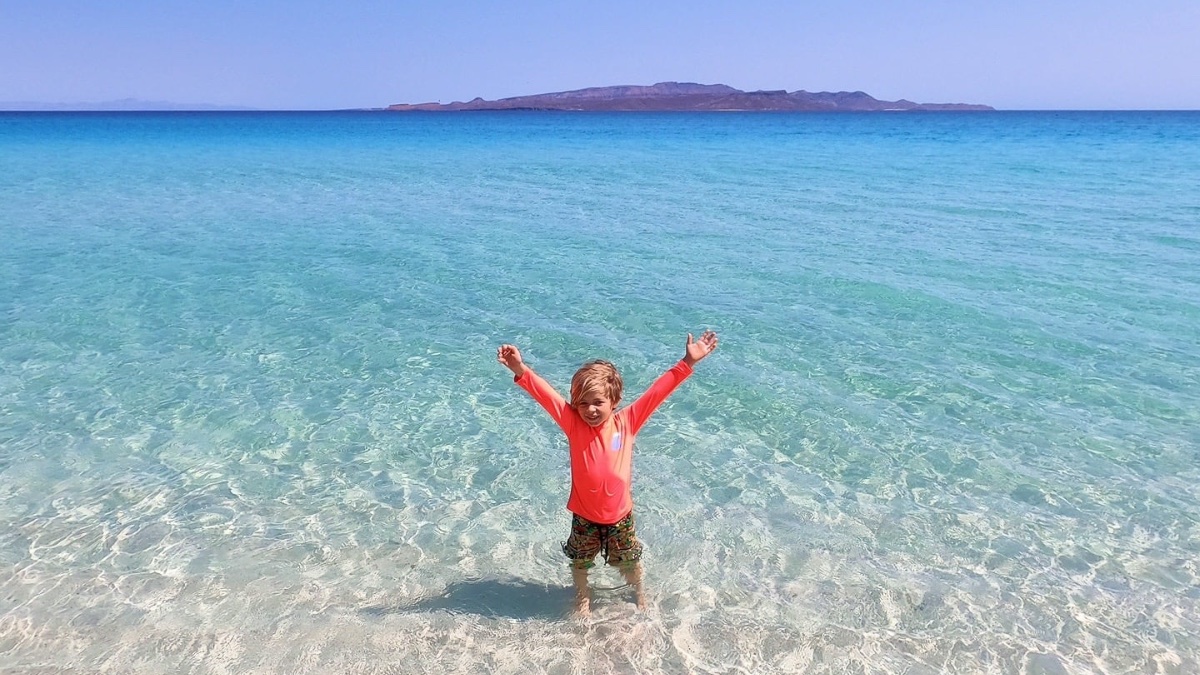
But it may well be very different.
Yes! We are all in this together! That can’t be overstated.
But…some among us are waiting things out in a fully self-sufficient chateau on an isolated island paradise;
Many among us have watched the virus wipe out several members of immediate family whilst waiting desperately in lonely isolation for lifesaving medical equipment;
Many among us are hold up in makeshift tents on the frontier of a spreading infection without clean water, sanitation, food, family, financial resources, and nowhere to run;
And of course, there’s the rest of us, the vast majority who find themselves somewhere in between.
This is where we are.
The Current Status of Our Family
These past few days, our lives have been dominated by risk analysis, confusion, astonishment, provisioning, information overload (and information scarcity), virtual meetings, and potentially life and death decision making.
Not to mention, caring for two crazy and rambunctious toddlers cooped up in our small urban flat.
As the world around us has shut its doors literally overnight and most airlines have halted service, Cambodia finds itself in a de facto state of isolation.
All land borders have closed. Cambodians are forbidden to leave the country and entry to foreigners, by and large, has been drastically limited.
Non-resident foreigners (i.e. travelers and tourists) have been strongly advised to leave Cambodia.
Resident foreigners like us have been given the choice to stay or leave based on our circumstances.
A great many expats we know are preparing to leave or have already left.
We have chosen to stay.
This is not a decision we take lightly, nor is it an attempt to project stoicism to family and friends or put on a brave face for our kids.
Far from it.
After seemingly endless conversations with colleagues, friends, experts and others in the know, we’ve weighed all known risks and determined that, based on available information, staying is the best course of action for us.
It’s easy to make decisions in times like these based solely on fear alone. But doing so rarely results in the best choices.
Living, traveling, and working in developing contexts for nearly ten years over the past two decades has taught us that much.
That’s not to say it’s easy.
It’s not.
Fear breeds fear. And it’s easy to get sidetracked. It’s easy to second guess yourself.
And watching friends and acquaintances, who just days ago touted the virtues of staying, announce on social media that they’ve decided to leave, makes it that much harder.
The doubt can be all-consuming. And incredibly isolating.
You realize in these times that you only have yourself and your own assessment of things to rely on.
After all, you are the only one who can determine what yours and your family’s threshold is.
And it will be different for everyone.
Canadians have it easier than most. Their government ordered the repatriation of all Canadians to Canada.
As of now, Canada has not been widely affected yet, with just under 2,000 cases and 27 deaths over a land area of 10 million square kilometers.
Oh, and let’s not forget universal health care.
It’s good to be Canadian right now (it rarely isn’t).
For our family, it’s much more complicated.
The situation here in Cambodia is uncertain. Nobody can tell at the moment if Cambo’s going to be hit hard or spared the brunt of the suffering in the region and the world.
While authorities are preparing for the worst, there are no current indicators that a full blown health crisis is in fact imminent.
And looking around at much of life continuing per the usual, there are no tangible indicators that the shit is about to hit the proverbial fan.
But Cambo’s health system is ill equipped for a full on outbreak, and will most certainly become overwhelmed in the event of a sudden explosion of cases.
Civil unrest may be an issue and it will be next to impossible to leave the country in the event we need to once the government drops the hammer.
Thus, we may find ourselves in Cambodia in the midst of a widespread health, economic, social, and/or political crisis with nowhere to go.
So why stay?
Well, to put it simply, we don’t have any better options right now.
Risks are higher in neighboring countries in the region with maybe the exception of Thailand, but by and large, that ship has sailed with the tightening of borders, difficulty with visas, etc.
So what about going back to the U.S.?
Well…the U.S. ain’t doing any better at the moment.
It’s awfully hard to leave a situation in Cambodia where:
- Our city is largely unaffected at the moment;
- Food and goods (including TP!) are plentiful;
- There is not yet a full blown health crisis or few signs of one looming at present;
- We have secure and guaranteed long-term affordable housing;
- Lori has a steady job that is more or less guaranteed through September;
- We have health care coverage (however, we would be able to add U.S. coverage at a considerable expense starting next month);
- We have a reliable support network here made up of friends and colleagues with years of emergency response experience who aren’t going anywhere any time soon.

On the other hand, if we chose to repatriate at this time:
- We put our young family of four at heightened risk of infection and introduce immense logistical and economic hardship to get from here to the U.S., where we’d most certainly be quarantined alone with two toddlers in a hotel room for 14 days with very few toys or other critical resources;
- Plus the fact that we’d have to find long-term lodging (while potentially still paying on our place here), we’ve got some parents that are highly vulnerable to the disease, and if Lori was able to continue her work remotely it would be a graveyard shift to align with Phnom Penh time;
- Oh, and…our family is concentrated in one of the worst hit regions of the U.S., scattered across Oregon, Washington, and California. To top it off, our parents all live in the same small town which happens to be the county seat of the fourth most at-risk county health system in the entire U.S. in the event of a COVID-19 crisis.

But that’s not to say staying doesn’t pose a number of other challenges.
Here are some of the more acute challenges many of us are dealing with at the moment in Cambodia:
Challenge 1 — No One’s on the Same Page
One of the hardest things for us at the moment is the vast range of perspectives and ideas on how to address the situation here with very little guidance from the authorities.
Our social networks in Phnom Penh are diverse and multinational.
You’ve got the Italians, Spanish, and other Europeans freaking out (for good reason!) and shouting from the rooftops to self-isolate/ stay home/ prepare for the worst.
You’ve got the French who for some unfathomable reason keep traveling around while their own country implodes (currently French nationals make up a third (34/91) of known cases here in Cambo).
You’ve got the Americans seemingly distributed across two camps:
- NGO workers/ teachers/ health professionals who are advocating for social distancing/ preventive measures/ common sense/ more guidance from authorities…
- …and the lifer expat (i.e. permanent resident) deniers who say it’s all a Chinese/ American/ [fill-in-the-blank] conspiracy or fake news or whatever.
And of course, you’ve got the Cambodians.
Those very few Cambodians working in international circles (NGO/ international schools/ etc.) seem to be very cognizant of what is happening beyond the confines of Phnom Penh, Cambodia, and Asia.
The vast majority of Cambodians, however, appear to have little or no concept of the global crisis unfolding beyond their city, continuing to go about their daily lives as if nothing unusual is happening.
It’s hard to know what they know at this point, as most in this camp probably can’t read English/French (or don’t have access to foreign media), and many can’t read Khmer.
Regarding those who can read Khmer, it’s hard for us to say what kind of information they are receiving, or how many everyday Cambodians actually follow traditional news media at all.
What we do know (confirmed by many local contacts and the Cambodian government) is that a majority of Cambodians heavily rely on social media (e.g. Facebook) for their “news”.
At the moment, Cambodia has a huge problem with rumors, lies, and truly fake news circulating on social networks. There’s also a huge problem with profiteers spreading misinformation to sell products claiming to protect against or cure COVID-19.
You also have an element of distrust among many Cambodians with regards to government and authorities (both local and foreign), so many choose to trust their social networks rather than Cambodian or international experts or authorities.
All of this breeds three things:
- Fear.
- Deep divisions and distrust of people who don’t share one’s perspective.
- Judgment of those not acting in accordance to one’s own belief of a) what the situation actually is; b) what should be done to address it.
Which brings us to the next big issue…
Challenge 2 — What is Cambodia’s Current Status?
There are some things that we do know:
- The first confirmed COVID-19 case in Cambodia was announced on January 27th — a Chinese national who had traveled from China. He was promptly isolated and his contacts traced. He has since recovered.
- Then, no new developments for over a month.
- The second confirmed case wasn’t announced until March 7th.
- The vast majority of confirmed cases have come from abroad (foreign nationals, tourists, or Cambodians returning from abroad), with no reports thus far of community transmission.
- This past Sunday 15,000 Cambodian migrant workers returned from crisis-hit Thailand following Thailand’s decision to abruptly close its borders to foreign nationals, a great many of which have avoided health checks.
- To date, all schools, bars, playgrounds, and pools have been ordered shut, and there has been a ban put in place on religious gatherings. Cambodians are no longer permitted to leave the country, and entry by foreigners from many countries is banned. All land borders are shut.
- Restaurants, casinos, shops, malls, and markets have not yet been restricted.
The big question on everyone’s minds, however, is to what extent people within Cambodia have actually been infected.
To date, health authorities are not testing anyone who hasn’t recently returned from an affected country or been in direct contact with someone who has, despite which symptoms they may have. Given the long (and often asymptomatic) incubation period of the virus, there’s no way of knowing what the true infection rate is here.
Due to lack of testing kits and resources, health workers are relying almost exclusively on differential diagnosis to fill in the blanks, but even these measures (mainly temperature checks) are neither widespread nor being administered consistently when they are practiced.
In the absence of clear guidance or decrees from authorities, the only thing to do is look to locals’ social cues. As of yesterday afternoon, it very much appeared to be business as usual in Khmer parts of town.
And indeed, we have not seen or heard of any evidence that hospitals have begun admitting increased numbers of patients with pneumonia-like symptoms.
Of course, there are those who say the government could be keeping these details under wraps.
But in a country like Cambodia in this day and age, a few cases perhaps, but successfully hiding a lot of cases for so long would be extremely unlikely.
So, you’ve got people like us who are essentially sheltered-in-place, doing our part to preemptively flatten the curve (if there’s even a curve to be flattened), and many more who are looking around at the reality they are seeing with their own eyes and continuing to go about their daily business.
Challenge 3 — Operating in a Developing Context
And who can blame them?
Unlike the highly industrialized nations of the West/North, there are few people here who will be able to weather a crisis on the level of what Europe, Iran, China (and parts of North America) are dealing with.
In the U.S., we have far fewer safety nets these days, but still far more than the average Khmer person. Most people here live hand to mouth, and if business ceases, so does shelter and food.
The Cambodian economy has exploded in the past decade, and many have benefited from that.
But unlike in Laos, which has been much slower to develop, where the population remains poorer on the whole, the average Cambodian has very little to fall back on.
Say what you will about Communism (much of it justified), but in times of national crisis and distress such as these, I have no doubt, the people of Communist Laos will fare far better than Cambodia.
Those at the greatest risk are the poor living in rapidly industrializing liberalized economies such as Cambodia.
Mind you, that’s purely from an economic standpoint, and is by no means an assessment of health care systems. In that respect, Cambodia is in a far better position. Not a great position by any means, but a better one than neighboring Laos.
Challenge 4 — Health System Risks & Limitations
Cambodia’s health system might score better than Laos’, but there is still very little here to feel optimistic about in that respect — certainly when you see the extent of the strain that this pandemic has put on some of the most developed health systems in the world.
The health systems of some U.S. States and European countries are already overwhelmed and in some cases on the verge of collapse.
The biggest concern among those of us choosing to stay in Cambodia isn’t contracting COVID-19, per se, but what a bonafide outbreak and national crisis would mean for treating COVID-19 along with all the other common (and deadly) health hazards we’ve come to accept as part of the territory of living in Southeast Asia (tropical and other communicable diseases, food borne illnesses, road accidents, etc.).
We’re mitigating such risks to the extent that we can by getting our flu shots, stocking up on antibiotics and other medical supplies, prioritizing sanitation, and limiting our movement.
But there will always be risk.
But again, it’s impossible to know the extent of such risks when we don’t yet know whether we are yet operating in a crisis.
So, What Now?
Lori and I know we’re in a better position than most at the moment. Though we chose to self-isolate, we’re not formally on lockdown. None of the four of us are over 70 or have any health issues that would put us at a heightened risk. We still have ready access to both basic necessities and whatever luxury consumables we’d normally have access to. We’ve got a secure income, stocked cupboards, and a roof over our heads.
We also know that fortunes can change on a dime in this global climate.
One of the craziest things we find ourselves reckoning with in all this is how we can leave our house and see daily life continuing largely unchanged. Then, read or listen to the BBC, NPR, Seattle Times, etc., and instantly be sucked into an entirely different reality in Italy, Spain, the UK, New York City, Washington State, or even Southern Oregon where our parents live — knowing all the while that in an instant our reality could in fact become that reality.
The not knowing is the hardest thing. Not the usual not-knowing-when-the-global-crisis-will-end, but rather the not knowing if and when there will be a crisis at all; not knowing if and when a lockdown will be ordered; not knowing if and when the fragile society of a developing country will reach its breaking point and whether the entire situation will deteriorate into chaos and hopelessness not unlike many better equipped places around the globe already have.
There’s a feeling among many in the international community here that everything would be far easier to manage if the authorities would finally decide to call it, clamp down, and take the confusion and need to make a lot of these judgment calls on our own off the table.
For now, we wait. We wait, we wait, and we wait—
—That, we do have in common with nearly every living person on the face of the planet. Has there every been a time in human history where so many found themselves collectively waiting at once?
—Digesting the day’s news from around the world while watching the sunset over the hustle and bustle of the uncomfortably lively streets of Phnom Penh from our upstairs balcony.
—Self-isolating with my Pi Mai (Lao New Year) 2563 limited edition can of ice cold BeerLao, specially made for a festival that won’t exist — a sobering reminder of the countless alternate realities that are nobody’s reality at the moment.
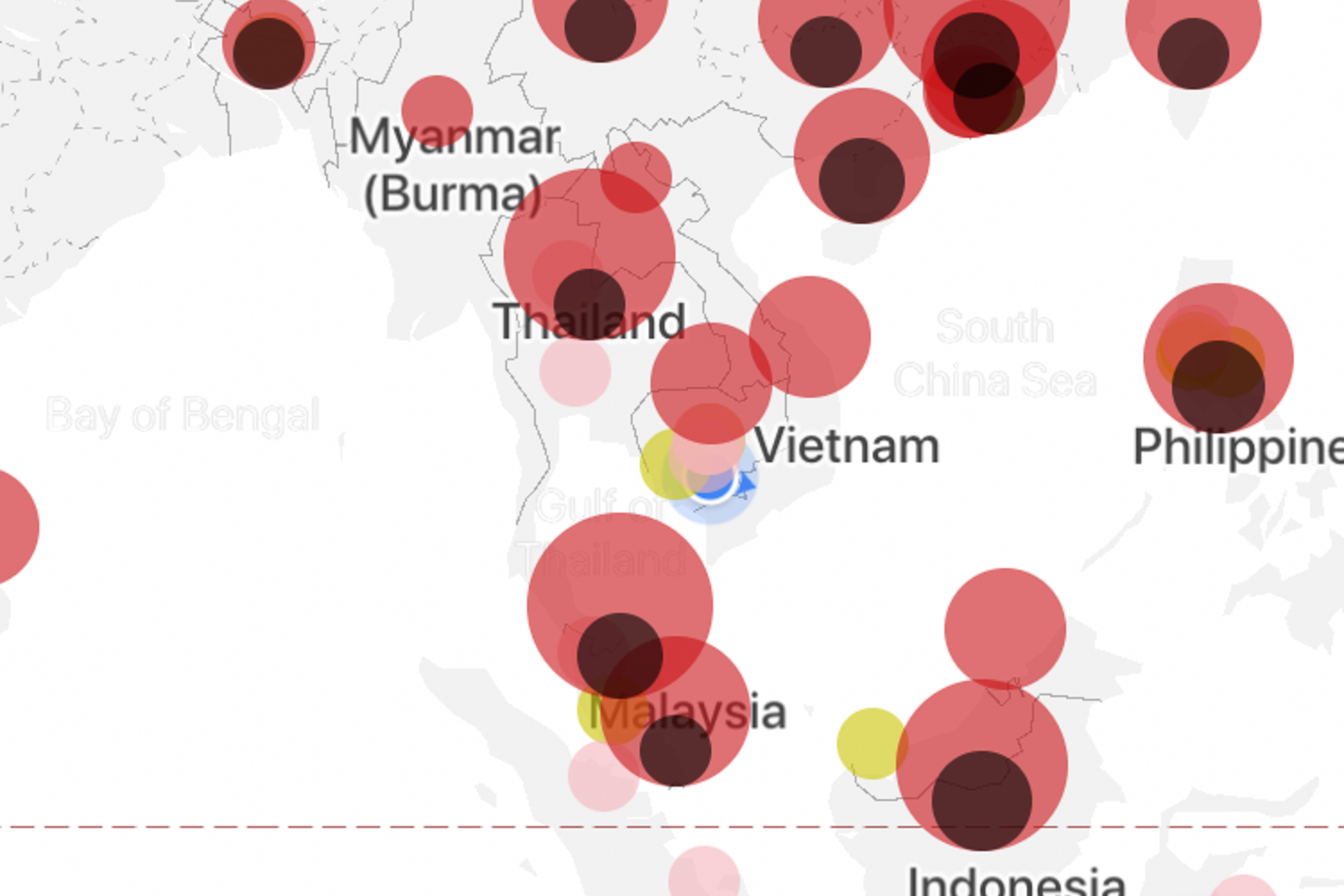
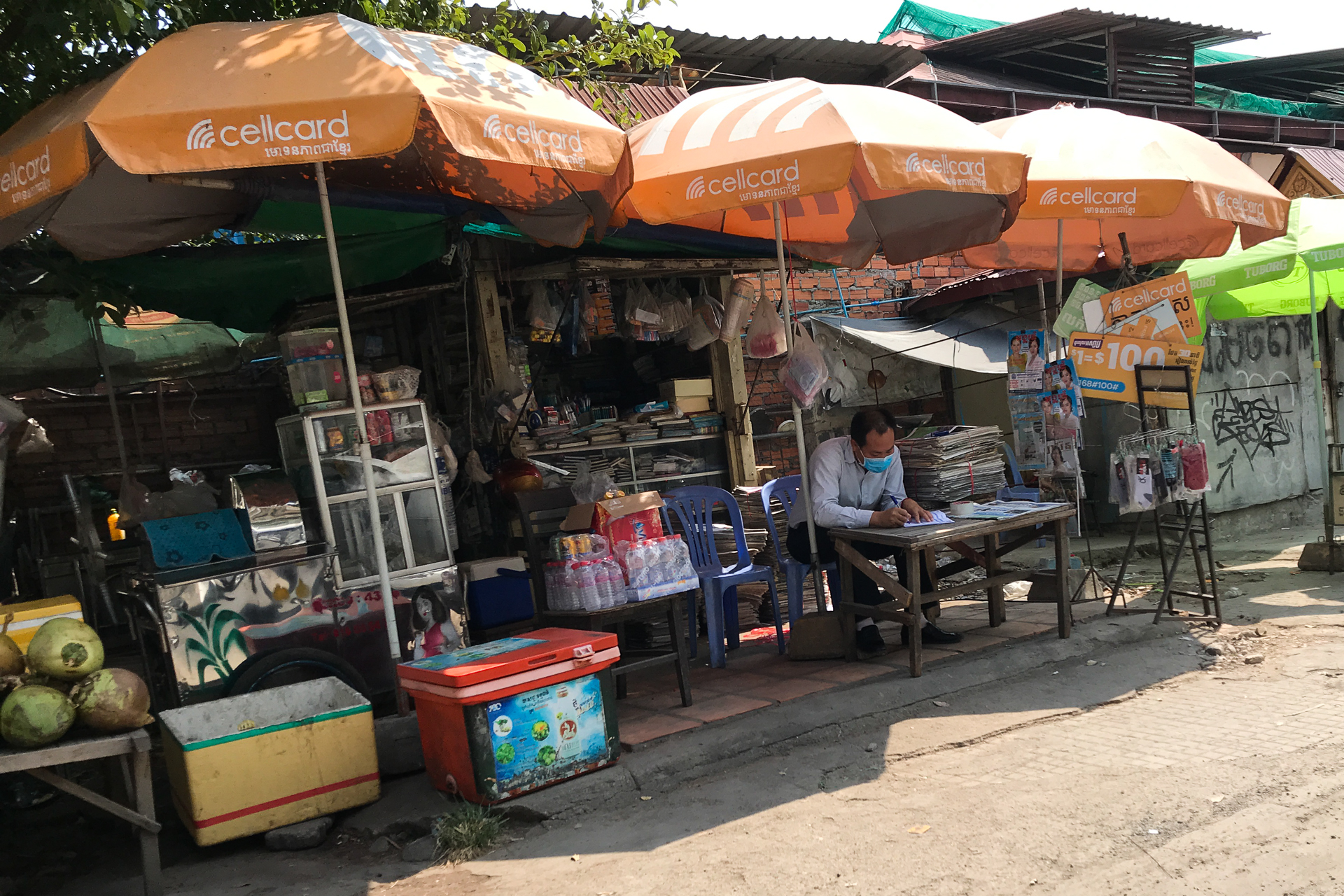
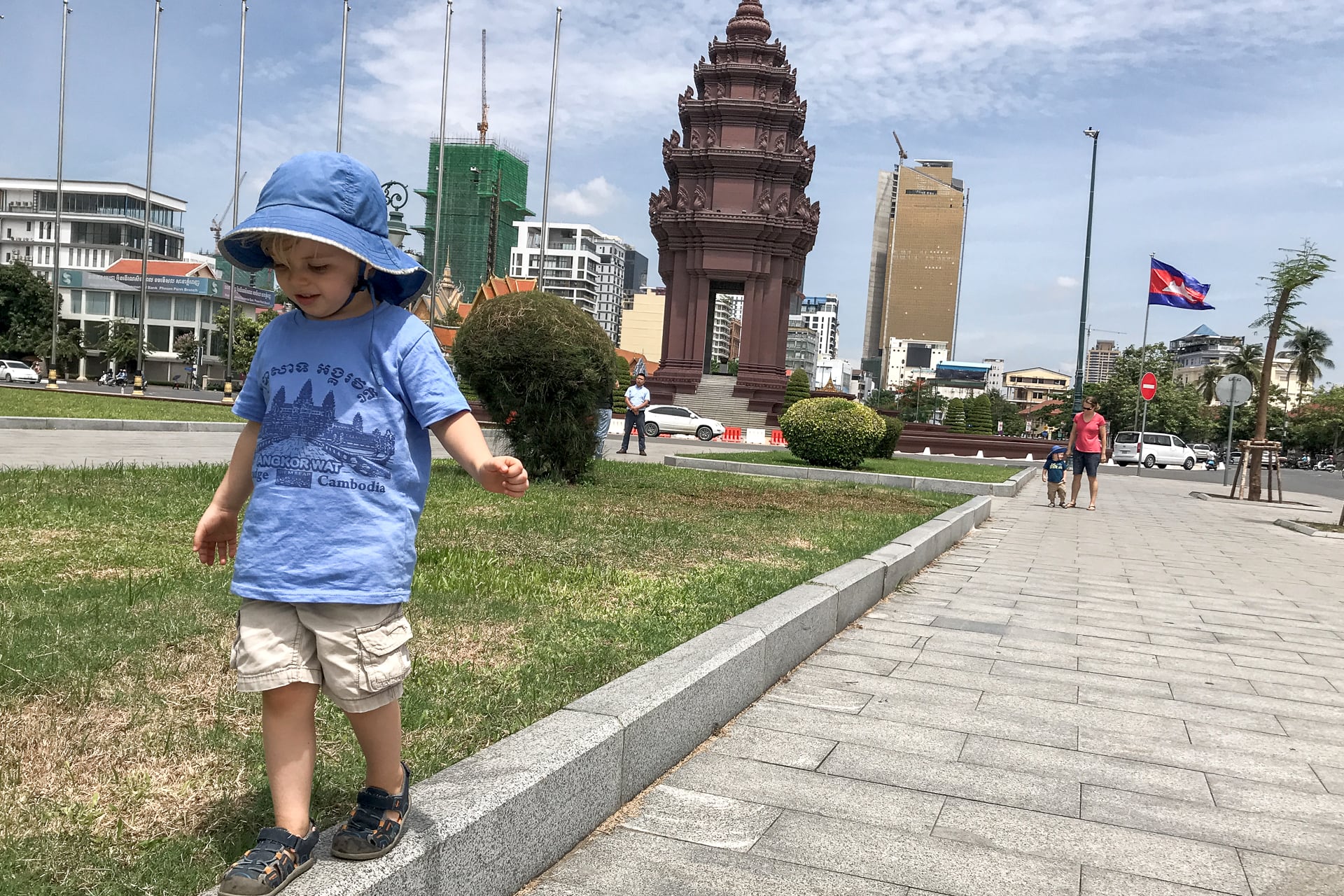
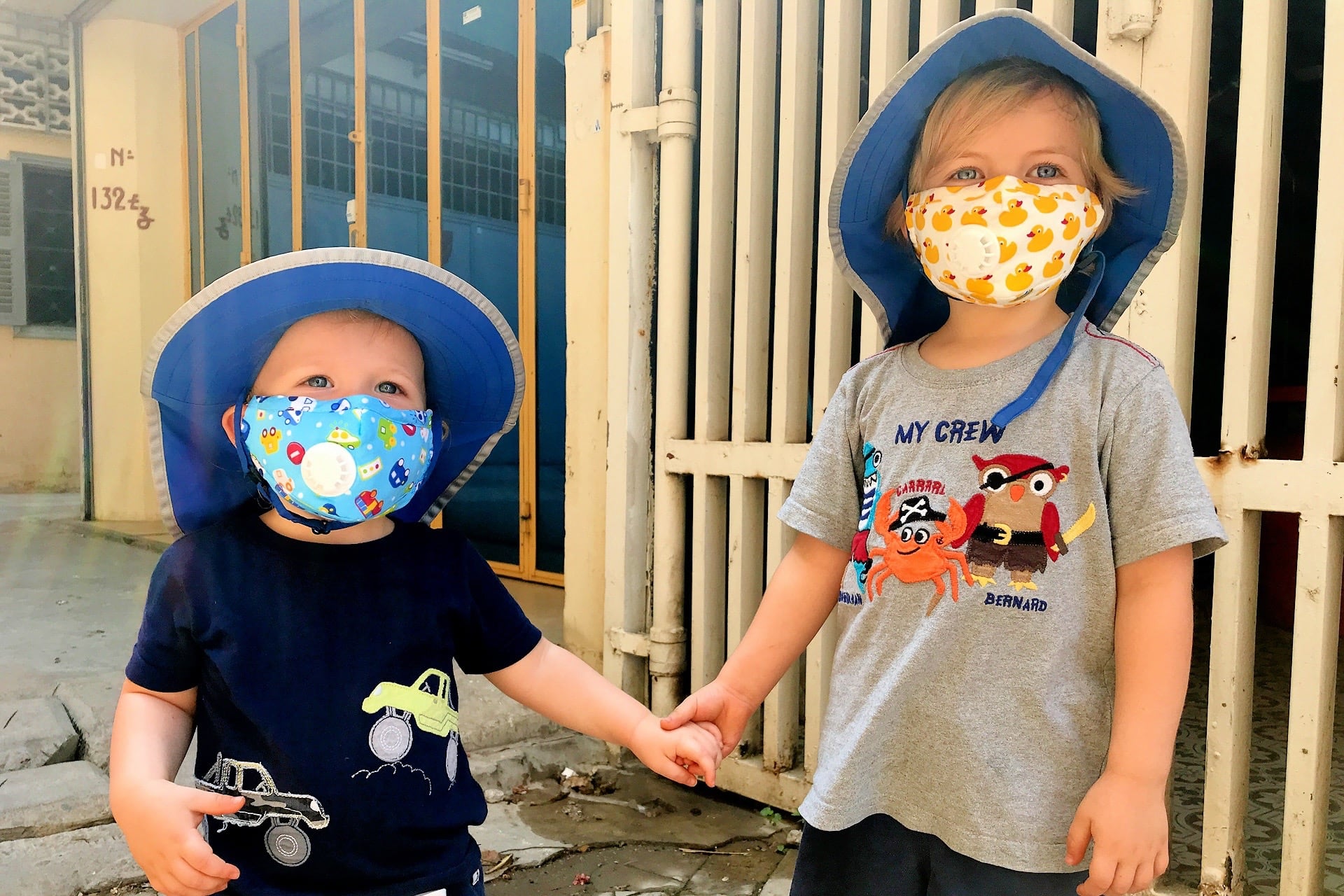
Prayers for you! At least you don’t have t watch the bozo on tv every day! Thanks for your message
Good to hear from you, Denise. Thanks for your message! Good point. We think about that a lot, actually. 🙂
Thinking of you and praying that the virus basically bypasses Cambodia on its sweep around the world.
Thanks, Janice. And same to you. We’re keeping our fingers crossed that the 100+ degree heat and humidity is working in our favor here.
Wait. … And trust our God who can do more that we can imagine, if we will just ask and trust Him for His best.
Thanks, Aunt Jeanette!
Thinking of you guys! Best wishes for sheltering in place with the kiddos. Sending virtual hugs.
Be safe, wash your hands, keep making good decisions. Thanks for your informative post.
Crazy times. I’m sure you have spent a lot of time weighing what to do. Hang in there and we’re thinking of you guys ❤️